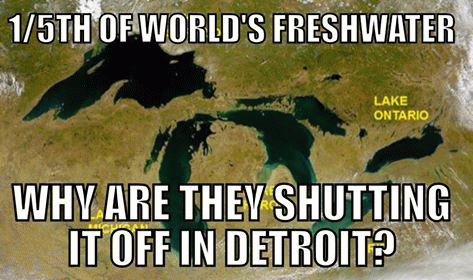tle=-- href="http://www.usccb.org/bible/readings/080314.cfm" target="_blank">Readings for 18 th Sunday in Ordinary Time: IS 55: 1-5; PS 145: 8-9, 15-18; ROM 8: 35, 37-39 MT 14: 13-21
I've been vacationing in Michigan over the past month. We're living in the lovely cottage my wife, Peggy, inherited from her father in the northern part of the state.
The community there is called Canadian Lakes. It's white, upper middle class, and very pretty. Peggy and I have spent large parts of our summers there ever since we we've been married. Our kids feel attached to the place. In a sense, they've grown up there.
In a word, life at Canadian Lakes is good. It's water-centered and comfortable.
That makes today's liturgy of the word (with its emphasis on the free gift of water) especially poignant for me. So does the fact that our lake home is located in Michigan with Detroit not so far away. Water's a problem there.
You see, the relationship of Detroit's poor to water is very different from ours in Canadian Lakes. Unlike our lakeside community, 44% of Detroit residents fall under the poverty line; 83% of the city's population is African American. Unemployment in the former Motor City is well above 14.5%. Yet, Detroit's (unelected) City Manager has been cutting off the water of poor people there. Regardless of your circumstances, if you're an ordinary Detroit resident two months, behind on your bill, you will suddenly find yourself without water for drinking, bathing and flushing toilets.
If you're rich, however, it's a different story. Some of the city's largest corporate water users are also behind on their water bills -- even years behind. For instance high-end golf courses, the Detroit Red Wings, the city's football stadium and more than half the city's commercial and industrial users owe back water bills totaling over $30 million. No one is cutting off their water.
It's also worth noting that the price of Detroit's water system (administered by private contractors) is more than twice the national average and that the water cut-off plan is part of a scheme to move the city towards a completely privatized water system. Some see it as a measure intended to drive Detroit's poorest from the city for purposes of gentrification.
Detroit's water policy has recently gotten world-wide attention. A United Nations Human Rights office designated it a clear violation of fundamental human rights.
In the light of today's liturgy of the word, we might also designate Detroit's plan (and in general the commodification of God's free gifts to all of creation) as a violation of God's order. In fact, today's liturgy of the word implies indictment of water privatization schemes and the market system's practice of treating food itself as a commodity. These are gifts of God, the readings say -- part of God's gift economy which is unbelievable in its generosity.
And why should we be surprised? The God celebrated in today's responsorial is described as "answering all our needs." According to the psalmist, that God is gracious, just, holy, merciful, slow to anger, hugely kind, and compassionate. S/he gives food to everyone and everything -- without cost.
So why pay for water? Isaiah asks. "All you who are thirsty, come to the water!" he says. "You who have no money, come, receive grain and eat; come, without paying and without cost, drink wine and milk!"
The point of contrasting God's "gift economy" with our exploitive "exchange economy" is driven home in today's Gospel episode from Matthew the evangelist. The famous "miracle of loaves and fishes" is actually a dramatic parable about God's Reign and its order. The event may even be factual in the way I'm about to explain.
In any case, the tale is symbolic. It's about the way the world would work if God were king instead of Caesar. In God's dispensation, the gifts of creation -- food and drink -- are given to all without payment. God's order contradicts our own where food production and even water delivery reap huge profits for the rich.
You know the story. Jesus meets with 5000 men in the desert ("not to mention," Matthew says, "the women and children"). It's late in the day. People are hungry and no-doubt getting restless. Jesus' disciples offer a market solution to the problem of the crowd's hunger. They say, "This is a deserted place and it is already late; dismiss the crowds so that they can go to the villages and buy food for themselves."
(Note: You can view every article as one long page if you sign up as an Advocate Member, or higher).






